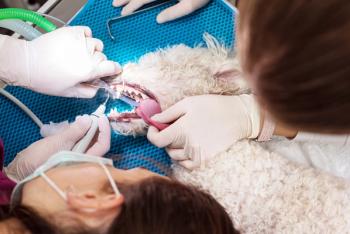
Dogs With Cancer Helping People With Cancer
A recent report shows that including dogs with cancer in studies of oncology drugs can speed the drug development process.
Comparative Oncology: Report from NAM Workshop
Including dogs with cancer in studies of oncology drugs can speed the drug development process, according to a
“We are hopeful this analysis will be useful in developing and advancing an agenda for the field of comparative oncology,” said Dr. Jeffrey Trent, one of the study authors, in a
Scientists at the workshop discussed gaps in comparative oncology research. Conclusions from workshop sessions include the following:
- Researchers and the general public do not fully understand the potential benefits of comparative oncology research.
- The biologic behavior of some cancers is nearly identical in dogs and humans.
- Studies of the genomic characteristics of canine cancers could advance the development of gene-based therapies in both species.
- Performing preclinical studies in pet dogs with cancer may improve the success rates of similar studies in humans.
- Imaging modalities used to detect cancer and monitor treatment in humans are already available in veterinary referral hospitals. The same types of imaging used in humans for end-point monitoring, including computed tomography and magnetic resonance imaging, can be employed in parallel studies of both species.
- Veterinary schools are the best resource for recruiting and managing dogs with cancer for drug development studies.
- A clinical trial registry for pets with cancer is needed.
- Toxicity data from studies of dogs with cancer will be treated as supplementary (not on the same level as data from controlled toxicology studies) by the Food and Drug Administration. According to the report, “This clarity alone was widely considered to be the most important outcome” of the meeting.
Dr. Laurie Anne Walden received her doctorate in veterinary medicine from North Carolina State University in 1994. After an internship at Auburn University College of Veterinary Medicine, she returned to North Carolina, where she has been in companion animal general practice for over 20 years. Dr. Walden is also a board-certified Editor in the Life Sciences and owner of Walden Medical Writing.
Newsletter
From exam room tips to practice management insights, get trusted veterinary news delivered straight to your inbox—subscribe to dvm360.




